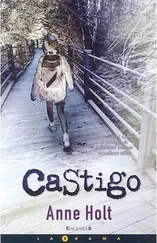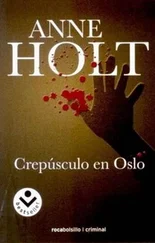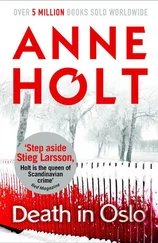The real headache was Lavik. Had he gone out of his mind? It was pretty obvious he intended to kill Karen Borg. As if that would solve anything! He would be the prime suspect. Immediately. Besides, who knew whether she’d told others, or written something down that hadn’t yet found its way into the hands of the police? Killing Karen Borg would solve nothing.
Killing Jørgen Lavik, on the other hand, would solve most things. The moment the thought was formed, it seemed his only recourse. The successful murder of Hans Olsen had effectively halted all problems in that branch of the syndicate. Lavik had just made matters worse and worse for both of them. He had to be stopped.
The idea didn’t frighten him. On the contrary, it had a calming effect. His pulse was beating steadily and evenly again, for the first time in days. His brain felt alert and he could feel his concentration improving.
The best thing would be to eliminate him before he had time to send Karen Borg to whatever heaven was reserved for lawyers. The murder of a young and beautiful, and in this respect innocent, female lawyer would have far too many repercussions. A desperate male lawyer on drugs charges wouldn’t die without causing a few ripples either, but still… One murder was better than two. But how to go about it?
Jørgen Lavik had talked about Ula. A cottage. That must mean he was thinking of going there. How he would evade the plainclothesmen who doubtless had him under constant observation, he had no idea. But that was Lavik’s problem. His own was to find Lavik, find him without being seen by those same officers, and preferably before he got to Karen Borg. He didn’t need an alibi: he wasn’t in the police spotlight, nor would he be. If all went well.
It would take him less than an hour to find the precise address of Karen Borg’s cottage. He could ring her office, or perhaps the local council; they could check in the land register. But that was too risky. A few minutes later he’d made up his mind. As far as he could recall, there was only one way down to Ula, a little track off the coast road between Sandefjord and Larvik. He would simply lie in wait there.
Relieved at having come to a decision, he immersed himself in the day’s most pressing tasks. His hands were steady and his heart was beating regularly again. Perhaps he didn’t need any new medication after all.
* * *
It was a bit more than a summer cottage-a substantial red-painted old wooden house from the thirties, completely renovated, and even in the gloom of December you could appreciate the idyllic character of the location. It was quite well protected against the elements, and though there was some snow on the approach to it, the rocky ground behind was scoured clean by the incessant wind off the sea. A fir tree swayed obstinately just a few metres from the west wall. The wind had managed to bend the trunk but not to kill the tree. It stood leaning away from the shore, as if it were longing to join its family further inland but couldn’t tear itself loose. You could make out the contours of summer flowerbeds between the humps of snow on the lee side of the house. It was all neatly tended. It didn’t belong to Lavik, but to his senile and childless uncle. Jørgen had been his favourite nephew when last his uncle had been able to feel anything of that nature. He had turned up faithfully every summer when he was a boy, and they had gone fishing together, caulked boats, and eaten fried bacon and beans. Jørgen was the son he’d never had, and he would inherit the beautiful summer cottage when Alzheimer’s eventually, and probably in the not-so-distant future, met its only match-death.
Jørgen Lavik had spent quite a lot of money on the place. His uncle wasn’t a poor man, and had paid for the essential maintenance himself. But it was Jørgen who’d installed a bathroom with a Jacuzzi, and a mini-sauna and a telephone. He’d also given his uncle a nippy little boat as a seventieth birthday present, in the certain knowledge that it would effectively remain his own.
On the journey down to the far end of the Hurum peninsula, he’d not once caught sight of his pursuers. There had been cars behind him all the way, but none of them had tailed him long enough to be likely candidates. Nevertheless, he knew they must be there, and was pleased about it. He didn’t hurry himself parking the car, and demonstrated his intention of staying for a significant period by carrying in his luggage in several instalments. He wandered from room to room gradually switching on all the lights, and lit the paraffin stove in the living room to supplement the electric heater.
In the afternoon he went for a short walk. He strolled over the familiar terrain, but even now couldn’t see or hear anything suspicious. He felt uneasy. Weren’t they here? Had they abandoned him? They couldn’t do that! His heart was thumping fast and nervously. No, they must be somewhere nearby. They had to be. He forced himself to be calm. Perhaps they were just very skilful. That was probably it.
There were a few things to fix. He must start without delay. He took his time on the doorstep, stretching himself and knocking the snow off his trousers at unnecessary length. Then he went in to make his preparations.
* * *
The worst of it was that everyone was so cheering. He was slapped on the back with a cry of “Nothing ventured, nothing gained,” and given congratulatory smiles and other friendly expressions of support. Even the commissioner had taken the trouble to phone down to him to convey her satisfaction with what he’d achieved, despite the unfortunate outcome. Håkon mentioned the possibility of a claim for damages to her, but she just snorted. She didn’t believe for a moment that Lavik would dare; after all, he was guilty. He was probably just happy to be free again and anxious to put the whole affair as far behind him as he could. Håkon could rest assured about that; in fact the officers tailing Lavik had reported that he was now out at a cottage on the Hurum peninsula.
The support didn’t do much to boost his morale. He felt as if he’d been put into an automatic washing machine, subjected to the centrifugal force of a complete washing cycle, and shrunk. There were other cases lying on his desk with imminent deadlines, but he was totally incapable of action and decided to let everything wait till the next morning.
Only Hanne recognised how he actually felt. She came by in the afternoon with two cups of hot tea. He coughed and spluttered when he tasted the contents, having assumed it was coffee.
“What shall we do now, Mr. Prosecutor?” she asked, putting her feet up on the desk. Nice legs, he thought, not for the first time.
“Don’t ask me.”
He sipped the tea again, a little more cautiously this time. Actually it wasn’t bad.
“We won’t give up, anyway. We’ll nail him. He hasn’t won the battle yet, just a little skirmish.”
It was incomprehensible that she could be so positive. It almost sounded as if she meant what she said. Of course, it might just be the difference between an active police officer and an official of the Prosecution Service. There were many avenues of retreat for him; he could find another job at any time. Assistant secretary in the Department of Fisheries, for instance, he thought glumly. Hanne, on the other hand, was trained as a police officer. There was only one possible employer for her: the police force. So she could never give up.
“Now you listen to me,” she said, putting her feet back down on the floor. “We’ve got a lot more to go on! You can’t lose your fighting spirit now! It’s in adversity we have the chance to show what we’re made of.”
Banal. But probably true. In that case he was a wimp. He definitely couldn’t tackle it. He was going home. Perhaps he might be man enough to cope with a few household chores…
Читать дальше












